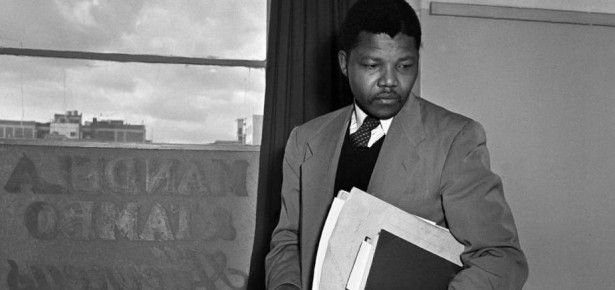
In his eulogy delivered at the memorial service for Nelson Mandela on December 2012, U.S. President Barack Obama recalled one Mandela’s justly famous declarations. Speaking from Pollsmoor Prison in 1985, a moment when his country was in tumult, Mandela responded to P. W. Botha’s offer of conditional release by bluntly correcting the apartheid leader’s understanding of South African law: “Only free men can negotiate. A prisoner cannot enter into contracts.”
Listening to Obama’s speech, I was reminded of a similar citation of contract law made by Mandela earlier in his life. In 1959 essay criticizing the “tribalism” of President Verwoerd’s apartheid policies, Mandela fixed on the writings of one of the primary architects of apartheid, Werner Eiselen. In Eiselen’s cynical view, the apartheid government’s brutal public policies should be seen on the metaphor of a private contract. Apartheid, Eiselen wrote, would only be acceptable “provided that the parties concerned agreed to this of their own free will.”
Eiselen’s metaphor was, of course, absurd. It assumed that African populations living under apartheid’s oppressive laws were free as “contracting agents.” In his 1959 essay, Mandela therefore wasted no time showing how Eiselen’s propaganda failed on its own terms. But from Mandela’s later statements, we may infer that he also saw in Eiselen’s metaphor something else: an opportunity for a forceful reversal of the apartheid state’s claims to legality and legitimacy.
From his study of the law of contract, Mandela knew that one of the grounds for “breach of contract” under South African private law was “impossibility of performance.” If I sign a contract with you promising to fix the plumbing in your house, and you then lock the door and refuse to let me in, our contract is null and void: your actions have made it impossible for me to perform my promise. The traces of Mandela’s studies are apparent in his famous speech at the closing of his 1962 trial (which I also discuss, in somewhat different terms, in my chapter on “Mandela and the Law” in the Cambridge Companion to Nelson Mandela). On this occasion, Mandela raised what he called “the question of responsibility.” Operating on the premise that apartheid is in fact a “contract,” who really should be responsible for Mandela’s “breach” of that contract?
Mandela’s answer was clear.
“This court has found that I am guilty,” he declared.
“But … the court must take into account the question of responsibility, whether it is I who [am] responsible or whether, in fact, a large measure of the responsibility does not lie on the shoulders of the government which promulgated that law, knowing that my people, who constitute the majority of the population of this country, were opposed to that law, and knowing further that every legal means of demonstrating that opposition had been closed to them by prior legislation, and by government administrative action….The court cannot expect a respect for the processes of representation and negotiation to grow amongst the African people, when the government shows every day, by its conduct, that it despises such processes.… Nor will the court, I believe, say that, under the circumstances, my people are condemned forever to say nothing and to do nothing. If this court says that, or believes it, I think it is mistaken and deceiving itself. Men are not capable of doing nothing, of saying nothing, of not reacting to injustice, of not protesting against oppression, of not striving for the good of society and the good life in the ways they see it.”
Now, Mandela easily could have made this argument with reference to the doctrines of natural law or human rights. But he didn’t do that. He instead treated Eiselen’s metaphor—the notion that apartheid was a sort of private contract between free parties—to demonstrate to the apartheid state why it, not he, was responsible for his illegal protest. Since the apartheid state’s own actions had removed any possibility for Africans to oppose apartheid laws through legal negotiation or representation, the apartheid state was also responsible for the “breach of contract” that occurred when Africans broke the law to protest against apartheid. Only a freely negotiated contract can be honored, Mandela would seem to have said here. An impossible contract cannot be performed.
The philosopher Jacques Derrida once argued that Mandela’s study of jurisprudence was “a question of mastering Western law, this weapon to turn against the oppressors, [who] do not finally realize, in spite of all their legal ruses, the true force of a law that they manipulate, violate, and betray.” In Mandela’s citations of contract law—in 1985 and 1962 alike—we are reminded of just how complete, just how fierce, this mastery was.
Latest Comments
Have your say!